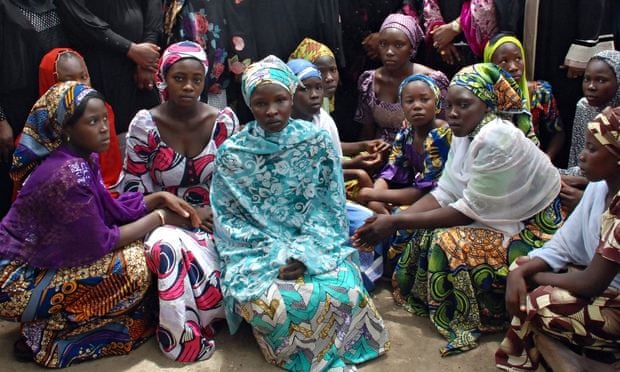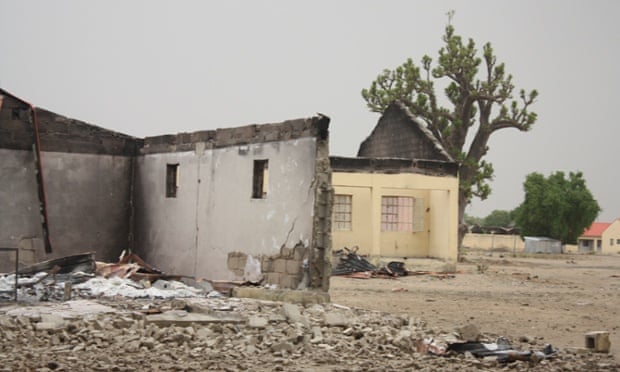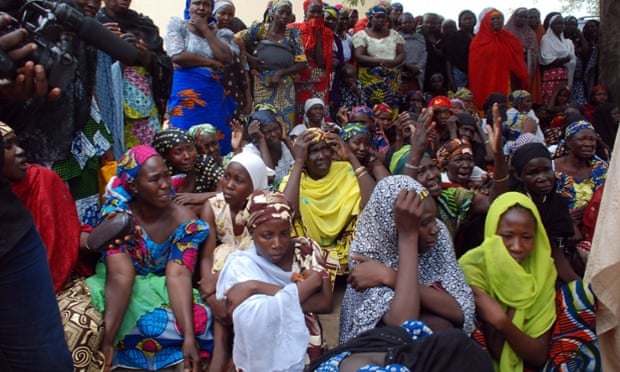Chibok girls who escaped Boko Haram defy militants by returning to school
Chibok girls who escaped Boko Haram defy militants by returning to school

The jihadis had warned they would shoot anyone trying to escape. But as the truck full of frightened schoolgirls sped deeper into Boko Haram territory, two sisters clasped hands and jumped off together into the night.
Now, they held hands once again as they faced another terrifying prospect: returning to school.
Asabe and Ruth evaded the fate of 219 of their classmates in the north-eastern Nigerian village of Chibok who are still in captivity.
The mass abduction last April propelled the sect into global infamy, as the missing students became an international symbol of Boko Haram’s escalating war against lay education.
But, far from the limelight, 57 young women who escaped were left grasping to make sense of their new reality.
They could not shake off the fear the militants would return for them. Instead of working towards becoming doctors, teachers or artists, the former students learned to sleep in the bush to avoid potential night-time raids.
By day, they roamed for miles under the unforgiving sun so they would not be around if the men with machine guns swooped in again.
Then, late one August afternoon, a stranger showed up at Asabe and Ruth’s tin-roof home offering a scholarship to study in Yola, the capital of a neighbouring state.
Acceptance would be a brazen act of defiance against Boko Haram, but the sect had repeatedly warned the students they would kill the families of those who continued schooling.
If these people [Boko Haram] come back, I will be one of their first targets for helping girls to come back to school.It was an opportunity as much as a risk.
“The problem was I had only one scholarship, and their father said he couldn’t choose between his two daughters. Nobody could decide,” the visitor recalled.
Finally she tore two leaves of paper from her notebook. On one she wrote: “Go to American University of Nigeria”; on the other: “Wait for another chance”. She folded them behind her back and waited for the young women, who sat silently holding hands, to make a choice.

But in a conflict where the state has repeatedly failed to protect civilians – leaving about 10,000 dead last year alone – she became one of an increasing number of ordinary Nigerians fighting back
“I don’t talk much about it, because if these people [Boko Haram] come back, I will be one of their first targets for helping girls to come back to school,” she shrugged. “I had to take the risk. Whatever happens to me, I can say I tried.”
Then, turning off the tarmac, she continued for another hour through a canopy of baobab trees that have served as Boko Haram’s hideout.
Chibok lay at the end of the dust road, and over the next 10 days, she rode a motorbike pillion across its 10 wards, trying to persuade one family in each district to accept a scholarship for their traumatised daughter.
Her personal quest provides a glimpse of how a community brutalised by Boko Haram – and still mourning its lost sons and daughters – has rallied together as it takes tentative steps to recovery.
“Many of the other villages around here have kept quiet because they don’t think education is worth the risk of attracting Boko Haram’s ire,” said Abbana Lawan, a Chibok resident whose two nieces are among those still in captivity. “But we’re a community who understands the value of education.”
Before Boko Haram started kidnapping and killing children, its murderous hatred was directed chiefly against the state.
Born to a policeman father in the sect’s heartland of Borno state, almost every milestone of Godiya’s life can be matched to an atrocity.
September 2004, the year she turned 16, was also the year her father was on a lunch break when Boko Haram attacked his police station, killing four of his colleagues.
She remembers the roadside bombs that began in 2009, because one of her neighbours died in one. A starburst shrapnel scar across her hand is a reminder of the first time she witnessed the horror firsthand.
When she recalls her eldest sibling’s engagement, she says, matter-of-factly: “We were worried because that was when they started burning down a lot of churches.”
Her father’s plan to escape the escalating conflict by moving his family to his ancestral farm in rural Chibok was soon shattered. Godiya’s younger sister was preparing to take exams when Boko Haram snatched her.
“This is the second time your sister’s school has been burned down. I’m not sending her back again,” her father said, when they ran to the smouldering wreck.”
But Jessica (not her real name) turned up the next day, her feet cracked and bleeding from walking through the dry forest all night after she escaped.
Godiya made a decision then. She approached her boss at the American University of Nigeria in Yola, Margee Ensign, an energetic, cheerful woman who has run the establishment for six years.
“She came into my office and, really quietly, she told me that her sister was one of the girls who had escaped, and she and all the other girls were just there in Chibok, doing nothing,” Ensign recalled. Could anything be done to help them?
Ensign set up a foundation, which garnered $50,000 (£33,000) in donations to put 10 girls through the university for one year.
Then came the task of finding families who dared accept. At first, things went smoothly. Martha and Saratu and Rehab’s families all said yes; Yagana, an orphan, received the blessing of her foster father; Kume was found sitting under a tree in the primary school – she had brought the family’s herd to graze around the deserted, weed-choked building.
Next, it took two days of discussions to convince Martha’s family. Godiya pleaded with her own father for four days before he relented and agreed his younger daughter could return to school.
Ladi’s father politely thanked her, but said they were moving away to escape the attacks. In yet another ward, residents claimed there were no escapees.

“I went there three times, and then they eventually told me there was one girl, but she had been married off,” Godiya said, sounding equally resigned and frustrated. “I don’t know if it’s true.”
She began to lose hope as she criss-crossed the sandy forest paths. “It was raining all the time and every time I went from one ward to another, I couldn’t see anything in front of me. I didn’t know if I could be attacked.”
Mary’s family were initially horrified at the offer. A crowd began to heckle her as Godiya tried to convince them. Some residents recalled how Boko Haram had ambushed and beheaded two psychologists sent by the government to help the traumatised inhabitants.
Mary’s father eventually agreed.
Exhausted, Godiya visited Asabe and Ruth, the two sisters, on the 10th day. Back in Yola, her boss Ensign heard about the two sisters’ dilemma and called their father. “You don’t have to choose,” she told him. “We’ll raise the money to take both your girls.”
Weeks later, while they prepared for the girls’ arrival, he called Ensign in a panic. Things were getting tense again in Chibok, he said. “Are you truly coming? We can’t stay in Chibok, so if you’re not going to come now, we’re leaving,” he told her.

For some, it was their first time owning a pair of lace-up shoes. That evening came a moment Ensign says she will never forget. As they got ready to drop off their daughters, one of the parents stood up to address the group.
She wore a carefully pressed purple top and, in a video recording, she smiles nervously and takes a deep breath before speaking.
“Education is scary,” she begins quietly. “So many people have discouraged us, and told us we should not put our girls in school or they will be kidnapped again. We are entrusting our children to you.”
But those who took the risk ignited a spirit of defiance. Over the next few weeks, other parents came forward.
“Ten more parents just sort of showed up at our gate and asked us to take their daughters. But after 21, we had to stop because that’s a big commitment,” Ensign said.
Martha, Margaret and Dorcas spend their days studying and trying to forget. They are not as loud as many other students, but when they speak they finish each other’s sentences.
“Remember,” Ensign says, finding them in a study room one recent afternoon, “on your first day here, you guys looked at the food and you were like, what is this?”
The girls all burst out laughing.
“We like the food now,” says softly-spoken Martha, with a shy smile.
“The hardest thing for me now is the language,” Dorcas says, shaking her head so her beaded braids clink together. “I want to keep improving so I can go back and help Chibok.”
Their home town has no water, and barely any electricity, she says. “We want to go back and help our community.”
Margaret, who wants to be a doctor, says they all want to return to help. “We are really looked after here,” she adds.
There is a pause.
None of them want to dwell on their abduction, which took place on a night when the students, bizarrely, were left alone on the school grounds. The sole member of staff, an unarmed security guard, fled when he saw the insurgents.
Dorcas returned to Chibok over Christmas. “It was OK to go back,” she says. “But I don’t like to go back to Chibok any more. I just feel … bad,” she whispers, shaking her head.
All three fall silent again.
The young women have turned down all offers of counselling so far, Ensign says. “They tell me they pray every night, and then they talk to each other. They don’t want to talk to anyone else about it.”
Turai Kadir, a member of staff, likes to tell a story of how she bumped into the girls three months after they arrived. “They said, don’t you recognise us? We’re the Chibok girls! One was so much taller, the other looked so much healthier, the other looked so much more cheerful. They were transformed,” she says.
Recently Ensign asked the girls to write an essay describing what education meant to them. “Education gives me the wings I need to fly,” Martha wrote.
Comments